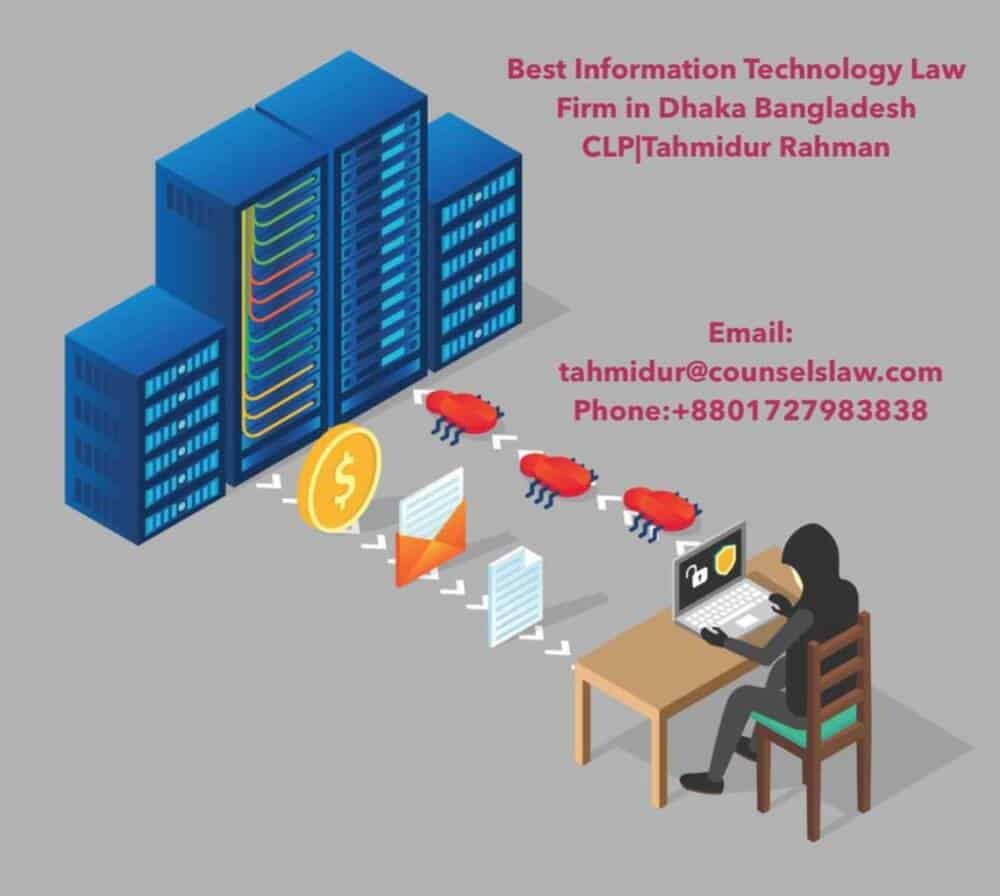Online Law / Internet Law in Bangladesh | ICT Act Rules, Regulations & Rights | A Complete Overview

Tahmidur Rahman, Senior Associate, TR Barristers in Bangladesh
20 Oct 2019
Table of Contents
Find the subsections below, If you want to jump through specific sections instead of reading the whole article.

This post in will explain in details the Online Law / Internet Law in Bangladesh | ICT Rules, Regulations and Rights in Bangladesh as an internet user with interactive diagrams and step by step discussion of different jurisdictions related using Information Technology in Bangladesh.
ICT ACT 2006
In order to facilitate e-commerce and promote the growth of information technology, the Information and Communication Technology Act (ICT) of 2006 of Bangladesh established provisions with a maximum penalty of up to 10 years imprisonment or a fine of up to 10 million taka or both. The ICT Act, 2006 as amended in 2013 is obviously quite a brilliant feat in the cyber law field of Bangladeh.
In Bangladesh, the ICT Act, 2006 was enacted to prevent cybercrimes and regulates e-commerce. Before this Act was enacted, the law applicable to cyber offences was the Penal Code, which was enacted long ago in 1860 when nobody even thought of computer technology or cyber crime. With the entry into force of the ICT Act, 2006, in order to meet the new requirements of cyber space crimes as well as c-commerce disputes, it becomes necessary to introduce certain consequential changes in certain provisions of the Penal Code, 1860 as well as in the Evidence Act, 1872.
What are the main offences in Bangladesh in regards to the Information Technology Law, Internet and ICT Act?
Some of the main offences are pointed out below that may arise out of Online Law / Internet Law in Bangladesh|ICT Rules, Regulations and Rights in Bangladesh (not in any specific order.)
1. Fake Electronic Publication
If any person intentionally publishes or transmits or causes to be published or transmitted on the website or in an electrical form any material which is false or obscene or which has the effect of tending to debase and corrupt persons, who are likely, having regard to all relevant circumstances, to read, see or hear the matter contained or embodied in it, or causes to deteriorate or creates possibility to deteriorate law and order, prejudice the image of the State or person or causes to hurt or may hurt religious belief or instigate against any person or organization, then this activity will be regarded as an offence.
◘ Punishment for Fake Electronic Publication
Anyone who commits the offense of electrically publishing false, obscene or defaming information shall be punished with imprisonment for a term of at least 7 years and a maximum of 14 years, and with a fine of up to 10 Taka lakes or both.
2. Hacking an electronic device ( Hacking a Computer/Phone/Info):
If any person with the intent to cause or knowing that he is likely to cause wrongful loss or damage to the public or any person, does any act and thereby destroys, deletes or alters any information residing in a computer resource or diminishes its value or utility or affects it injuriously by any means or damages through illegal access to any such computer, computer network or any other electronic system which do not belong to him, then such activity shall be treated as hacking offence.
◘ Punishment of Hacking an electronic device ( Hacking a Computer/Phone/Info):
“TR Barristers in Bangladesh is Considered as one of the leading firms in Information Technology Law in Dhaka, Bangladesh”
Carpe Noctem Bangladesh
3. Unauthorized access to protected systems in Bangladesh
Any person who secures access to or attempts to secure access to a protected system will be treated as an offence.
◘ Punishment for Unauthorised Access to Protected Systems
Anyone who commits an offense of unauthorized access to protected systems shall be punished with imprisonment for a term which may extend to a minimum of 7 years and a maximum of 14 years or a fine which may extend to or with 10 lakes of Taka.
4. Disclosure of confidentiality and privacy in Bangladesh:
No person having secured access to any electronic record, book, register, correspondence, information, document or other material shall disclose such electronic record book, register, correspondence, information, document or other material to any other person without the consent of the person concerned as an offence.
◘ Punishment for disclosure of confidentiality and Privacy
Any person committing disclosure of confidentiality and privacy shall be punished with imprisonment for a term of up to two years or with a fine of up to two Taka lakes or both.
Using a computer to help commit an offence in Bangladesh
Whoever knowingly assists in committing crimes under the ICT Act, using any computer, email or computer network, resource or system shall be considered an offense.
◘ Punishment for using a computer to help commit an offence
Any person who assists in committing an offense as set out above shall be punished with the penalty for the core offence.
How ‘Tahmidur Rahman, TR Barristers in Bangladesh & Associates’ helps the purchaser of any land in Bangladesh:
The Barristers, Advocates, and lawyers at TRW in Gulshan, Dhaka, Bangladesh are highly experienced at assisting clients in dealing with all kinds of offences and punishments under the ICT Act. For queries or legal assistance in regards to Online Law / Internet Law in Bangladesh | ICT feel free to call us on that green button or email us at info@trfirm.com
What is the purpose of the ICT Act 2006 in Bangladesh(Online Law / Internet Law in Bangladesh | ICT)?
The ICT Act promotes the Public Key Technology Trust Chain. The law allows digital certificate infrastructure to be developed and managed by the Controller of Certifying Authorities (CCA), including audits to be carried out.
The ICT law was formulated to promote the development of Bangladesh’s information and communication technologies. The aim is to facilitate the use of information and communication technologies to build the information society.
Where the information contained in a document is considered confidential by statute, confidentiality must be covered by appropriate means, including on a communication network.
Some Cyber Crimes which are to be dealt through this act are follows:
- Hacking or unauthorised entry into information systems
- Introduction of viruses
- Publishing or distributing obscene content in electronic form
- Tampering with electronic documents required by law
- Fraud using electronic documents
- Violation of privacy rights such as STALKING
- Violation of copyright, trademark or trademark rights
Advantages to be fruitful from the Act:
This Act has provided us with few advantages such as the conduct of important security issues under the ICT Act, 2006, which are so critical to the success of electronic transactions. The Act has given the concept of secure digital signatures a legal definition that would have to be passed through a system of a security procedure, as stipulated by the government at a later date. On the other hand, businesses can now conduct electronic commerce using the legislative framework established by the Act. This Act also provided other facilities for the operation of cyber business or information and technology sector.

Criticism of the ICT Act 2006
Although Critics ocassionally point out that certain specific limitations of the Act still remain. (Online Law / Internet Law in Bangladesh | ICT)
A. Practical Difficulty of Application
The legislation was originally intended to apply to crimes committed both in Bangladesh and worldwide but barely people practically take actions to execute their rights under the act.
B. Difficulties with Electronic Transaction
‘The enactment has an important effect on Bangladesh’s e-commerce and m-commerce. But as for the electronic payment of any transaction it keeps itself almost impractical.
C. Intellectual property Security
The Act is not vocal on the various intellectual property rights, such as copyright, trademark and e-information and data patent rights.
D. Not Addressing Mobile crime and contradicting Email Evidence
One of the staggering part of the act is that no crime committed via mobile phones is addressed in the Act. Also, this law admitted to convey emails as evidence, contrary to the Evidence Act of the country, which does not recognize emails as evidence.
Want new articles before they get published?
Subscribe to our Awesome Newsletter.
Obtaining a Dubai Golden Visa from Bangladesh
Obtaining a Dubai Golden Visa from Bangladesh: A Comprehensive Legal Guide by TRW Law Firm The United Arab Emirates (UAE), and particularly the Emirate of Dubai, has evolved into a premier global destination for high-net-worth individuals, entrepreneurs, and...
Company Audit Services in Bangladesh
Company Audit Services in Bangladesh in 2025 At TRW Law Firm, we understand that a company’s success hinges not just on profit margins, but on financial transparency, accountability, and compliance. That’s why we offer world-class Company Audit Services in...
Auditing Services for Local Businesses
Auditing Services for Local Businesses in 2025 In the evolving financial and regulatory ecosystem of Bangladesh, auditing services have emerged as essential for ensuring business transparency, accuracy in reporting, and legal compliance. For local businesses,...
জি.আর (GR Case) ও সি.আর (CR Case)
জি.আর (GR Case) ও সি.আর (CR Case) মামলা কি? আইন ও বিচার ব্যবস্থা বেশ জটিল এবং সূক্ষ্ম বিষয়। অনেকের জন্য ফৌজদারি মামলার বিভিন্ন প্রক্রিয়া বোঝা কঠিন হয়ে পড়ে। বিশেষ করে, জি.আর (GR Case) ও সি.আর (CR Case) মামলা সম্পর্কে অনেকেরই পরিপূর্ণ ধারণা নেই। সংক্ষেপে বললে,...
The Corporate Law Firm in Bangladesh and the Expertise of TRW Law Firm
The Corporate Law Firm in Bangladesh and the Expertise of TRW Law Firm: A Leader in Corporate Legal Services in Bangladesh TRW Law Firm is one of Bangladesh's most distinguished corporate law firms, offering a comprehensive range of legal services to businesses,...
Expats and Employment Law in Bangladesh
Expats and Employment Law in Bangladesh: A Comprehensive Legal Guide With Bangladesh’s growing economy and increasing foreign investments, the employment of expatriates has become more common across various sectors, including manufacturing, banking, IT, and...
This post is also available in:
English









